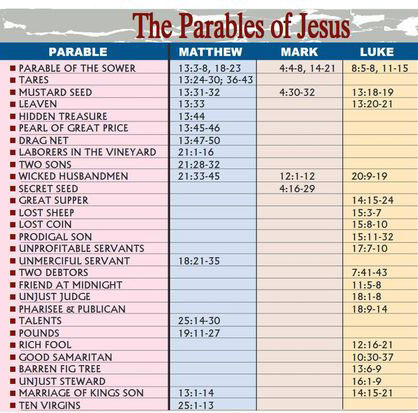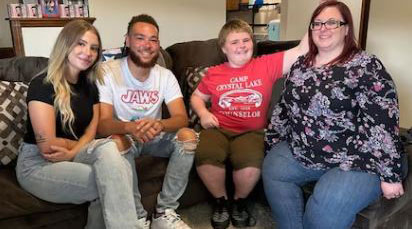
Beginning this Sunday and for the following two Sundays, we have the privilege of hearing Jesus tell four parables.
In Matthew’s gospel, as Eugene Boring notes in his commentary, the words, deeds, and mission of Jesus have caused quite a bit of conflict with and rejection by the leaders of Israel, and right before the passage that we just heard, Jesus is even in conflict with his own family. Jesus says that his family is not necessarily made up of his “blood kin,” as we say in the South.
Instead, the family of Jesus consists of the ones who hear the word and then do God’s will.
So according to Boring, Jesus tells the four parables that we find in the 13th chapter of Matthew in order to comment on the meaning of his rejection by the leaders of Israel and the founding of the new community of God, the community made up of those people who do God’s will—not necessarily the religious leaders of the day, or even his own family.
In today’s parable, Jesus, the sower, sows God’s Word, or the seeds, out in the world, with mixed success. Many of the seeds are lost as they fall on pathways so well-trodden that the ground is too hard to receive the seeds and so the birds eat the seeds up. More seed is wasted as it falls onto rocky ground. Even though some of the seed takes root, it withers away because there’s not enough soil to keep the roots moist. Other seeds come up but get choked out by the thorns that have also grown up alongside the seed. Finally, some of the seed falls on good soil and produces a harvest that is abundant beyond imagining.
So someone hearing this parable might come to understand that despite all the conflict and rejection with the leaders of Israel, a new understanding of God’s kingdom on earth will take root and produce an abundant harvest. This parable, as Boring points out, shows us the “mysterious, concealed working of God, who miraculously brings the harvest.”
The parables that Jesus tells start in a familiar world, but as the story goes on, those listening find that their usual expectations get challenged, and new understandings begin to take shape in their hearts and minds.
Imagine what would happen if Jesus were among us today, and wanted to tell a parable to us, to get us to consider what it means to do God’s will, to reconsider who is God’s family, and to ponder what an abundant harvest, brought about by the mysterious working of God, will look like.
I think that Jesus would tell a parable set in our familiar world. Jesus might even base his parable on a true story that reveals the mysterious, concealed working of God, who miraculously brings in the harvest of God’s new community of love.
So here’s a modern-day parable for us. A boy is the counterpart of the sower in today’s gospel.
In his short life of eleven or twelve years, this boy has struggled with autism, ADHD and other issues that have often made his relationships with other people problematic. This boy has been repeatedly bullied, and he doesn’t have any friends.
So he heads out into the world, going from door to door in his neighborhood to ask for friends.
In our parable, some people hear the doorbell ring and decide not to even go to the door because they aren’t expecting a visitor, so the person at the door is automatically unwelcome.
Other people go to the door and peep out to see who is there. “I have no idea who this kid is! I’m not answering the door!”
As the parable goes on, someone else goes to the door and yells at the boy when he rings the bell, telling him to go away, because has no business disturbing this household in the middle of the day.
At last, the boy rings a doorbell and gets a response.
Although no one comes to the door, the person who lives in the house but is at work sees the boy standing at the door in his Ring, and so he decides to talk to him through the app on his smartphone.

The boy wants to know if any eleven- or twelve-year-olds live in this house, because, the boy says, “I need some friends really bad.” The owner says no, but tells the boy that there are some kids down the street. Maybe the boy should try their house. But the boy says no, that he isn’t friends with those kids anymore because when they played together, the other kids bullied him. The owner of the house tells the boy that he’s sorry he can’t provide him with any playmates, but when he sees him in the neighborhood, he will make sure to say hi.
Finally, someone has listened to this kid’s story.
The owner of the house, who has the whole conversation recorded, decides to post the video on TikTok and he entitles the video “Little guy looking for friends, broke my heart.” In no time, the video is viewed by 70 million people, and 11 million people give it a thumbs up. The wife of the man who talked with the boy, who was at home that day, but had not known that the boy was at her door because the Ring doesn’t ring inside the house but only on the app, starts a GoFundMe page, and in two days, people donate a pile of money to spread kindness to this young man.
The young man’s mother gets in touch with the two who had been kind to her son. She is worried about their motives, and concerned that all the attention will mean that her son might receive even more bullying. But through repeated conversations, and at last meeting in person, these two families have become close friends, “building a strong friendship in a short amount of time,” as one of the people put it. With the GoFundMe money, the boy’s family will take a vacation, something they haven’t been able to do for six or seven years, and they plan to donate half the money to charity. And dozens of people have contacted the boy’s mother to find out how they can be friends to her son.
What a harvest of kindness, care, and compassion for this child.
“We who have ears, let us hear!”
In today’s gospel, the parable is followed by an explanation, probably one told by people in the early church, rather than the commentary of Jesus—so I will follow suit and give you an explanation of the parable I’ve just told.
First, the background of the story. The parable is based on the true story of Shayden Walker, a boy who lives in Amarillo, Texas, and who recently went from door to door looking for friends. Brennan Ray, age 23, was the person who talked with Shayden and heard him out, responding compassionately to Shayden’s request for friends—”I don’t have a kid your age at my house, but when I see you, I will say hi.”
Then Brennan sows his own seeds and puts the word out on social media, leading to comments like “I’ve never wanted to hug a kid so bad in my life.”
And then Angell, Brennan’s wife, also 23, does some seed sowing of her own and starts a GoFundMe page for Shayden which brings in $37,000 in the two days it is up.
Shayden’s mother, Krishna Patterson, who at first was horrified that someone had posted a video and started a GoFundMe page in Shayden’s name, took the time to talk with the Rays and discovered in their conversations that all that had been done by the Rays was out of care and concern for Shayden.
This story, like a parable, gets us to think about several things related to the creation of God’s new community of love. The people who did God’s will in this parable were the ones who took the time to listen to one another, decided to act, and as a result, gave people around the world the opportunity to open their hearts in compassion as well. They also reminded the world of the harm that bullying causes. The Rays and Shayden and his mom created a new family that isn’t made up of “blood kin,” but is a family created out of care and concern for one another. These ordinary people bring forth a bounteous and unexpected harvest that is right in line with God’s will, that we will love our neighbors as ourselves.

And, a boy who has been bullied and had no friends now has found a new supportive community because he had the audacity to go to anyone and everyone, asking for friends.
In his Sermon on the Mount earlier in Matthew’s gospel, Jesus said, “Ask and it shall be given, seek and you will find, knock and the door will be opened for you—if you then, who are evil know how to give good gifts to your children, how much more will your Father in heaven give good things to those who ask him!”
So this modern day parable gets us to think. Who is the family of God? How do we do God’s will?
And this thought—don’t we all need to knock on God’s door? Don’t we all need to seek God’s love and compassion?
And, what should we do when someone knocks on our doors? What opportunities will we be given to help produce an abundant harvest of God’s love in this world?
And this modern-day parable gets us to consider the endless creativity of God– God uses every method available, seeds, soil, kids, TikTok, GoFundMe, Ring doorbells and even ordinary people like us, to continue to create the abundant harvest that is the God’s new community of love in this world.
I want to be part of that harvest. I hope you do too!
Resources: Shayden Walker
Boring, Eugene. “Introduction, Commentary and Reflections on the Gospel of Matthew” in The New Interpreter’s Bible, Vol VIII. Nashville, Abingdon Press, 1994.
